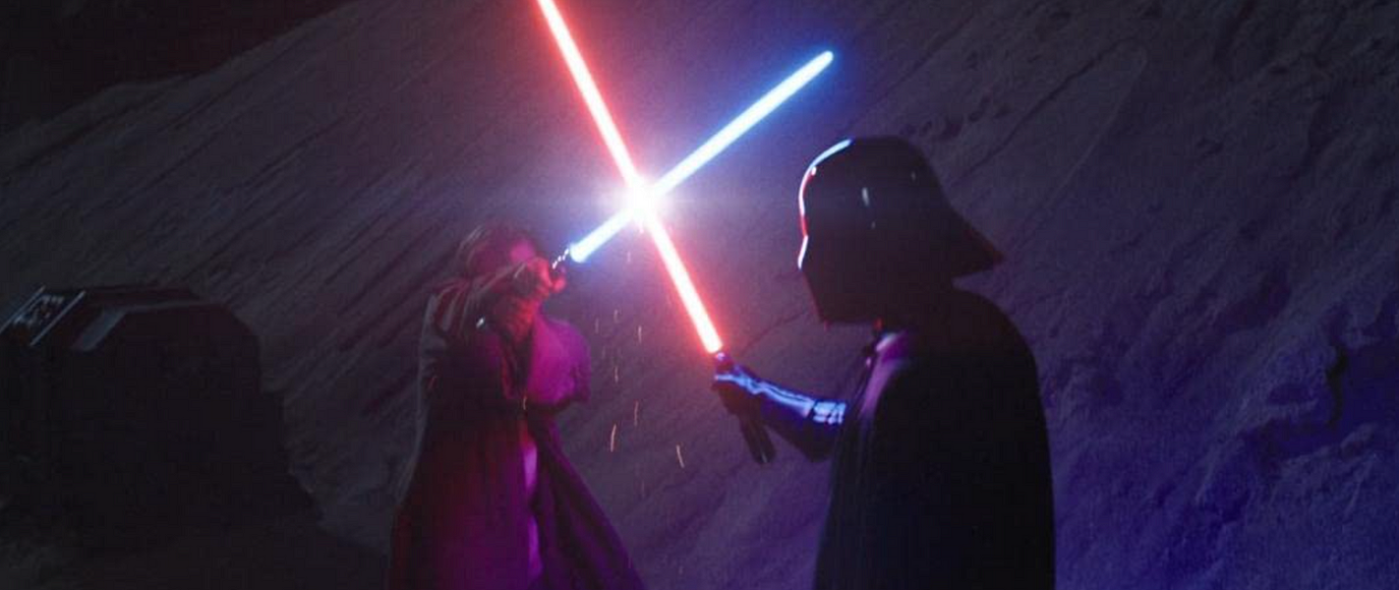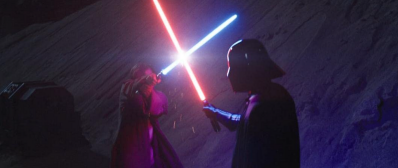Among Obi-Wan Kenobi’s many virtues is its live-action realization of concepts previously consigned to lower-profile properties in the galaxy far, far away—Inquisitors! Young Luke and Leia Skywalker! Quinlan Vos!—but it’s Ewan McGregor’s tortured betrayal of the beloved Jedi master that carries the day. Indeed through the halfway point of the series, the lowbrow takeaway is simple: Star Wars is at its best when it respects the spirit—and builds off—of George Lucas’s six entries into the cinematic saga.
Kenobi, set a decade after the events of Revenge of the Sith, introduces a “Ben” Kenobi (McGregor) appropriately scarred after watching the collapse of the order to which he pledged his life and the murder of most of his friends. Not to mention his fight with former apprentice turned Sith lord Anakin Skywalker (Hayden Christensen), where he removed three of his best friend’s limbs before watching him sustain third-degree burns. Ben works at a meatpacking plant. He lives in a cave. He buys parts from the Jawa he knows stole them from him. The Jawa tells him he smells. There’s nothing but bad feelings to have about watching a hero like Obi-Wan transform into an unfulfilled mediocrity like Ben.
Three things give him solace: The camel-like Eopie, who he rides into town and for whom he steals meatpacking scraps, protecting and watching a young Luke grow from afar, and the mistaken belief that Anakin is dead and no longer a threat to innocents across the galaxy.
All three silver linings are quickly stripped away from him when a young Leia is kidnapped from the Alderaanian royal palace and a reluctant Ben is compelled to recover her for his old friend and the princess’s adoptive father, Senator Bail Organa (Jimmy Smits). As the villainous and marvelously portrayed Grand Inquisitor (Rupert Friend) puts it “the Jedi Code is like an itch.” Kenobi, despite his best efforts, cannot help but scratch it.
Setting off after Leia, Kenobi uses his detective skills to quickly find her and… it’s a trap laid by the ambitious Darth Vader-lackey Reva (Moses Ingram). Reva is an inquisitor, a Force-wielding Jedi hunter employed by the Empire first introduced in the animated Rebels series, and is almost certainly one of the Jedi younglings portrayed in an excellent flashback scene to the attack on the Jedi Temple during Order 66. If there’s one thing the showrunners want us to know about Reva, it’s that she’s angry. If there’s a second, it’s that she’s obsessed with finding Obi-Wan Kenobi and delivering him to his very much still-alive old apprentice.
Reva’s character has already been the subject of much online rancor. Again, and this bears repeating, Reva is very, very angry. On its own, the sometimes seemingly single-minded pursuit of imparting this understanding of her personality can be grating. Combine that with the occasionally poorly-written and/or delivered line, and you have a recipe for irritating an already exasperated fanbase—particularly when criticism of the character is immediately decried as prima facie evidence of bigotry. But Reva has her redeeming qualities, and Ingram does well when tasked with Reva’s more subtle moments.
While Reva has been a mixed bag to date, the biggest risk taken by the Kenobi’s creators—the inclusion of child Leia as a kind of co-protagonist—has paid off. Vivien Lyra Blair portrays Leia with all of the joy, energy, spunk, and wisdom that the role demands, even if she seems too young to be quite so precocious. Her chemistry with McGregor makes for an often delightful dynamic, and ensures that she works not just as a plot device, but as a character. Perhaps Blair’s presence has been a touch too constant, but one can hardly blame director Deborah Chow for using her to the fullest extent possible.
And perhaps Leia’s prominence is made more forgivable by the titular character’s commanding existence. Obi-Wan Kenobi is very much about Obi-Wan Kenobi, because for every minute he’s on screen, you find yourself drawn in by the chastened Jedi master. McGregor, improving on his already highly-regarded performance in the prequel trilogy, is stellar. He’s the same character, with the same traits, namely bravery, humor, sentimentality, and practicality. But they’ve been adjusted by the tragic course of his life.
There are more cold calculations, and less altruism. There’s still humor, but it’s drier, and less full of mirth. Ben is as courageous as Obi-Wan, but he draws the line between bravery and foolishness at a different place.
The events on Mustafar 10 years prior left Obi-Wan nearly as broken as they did Anakin, and they robbed him of the ability to worry about questions like the fate of the galaxy, or of his obligation to protect all of its inhabitants. “The fight is done. We lost,” he says self-evidently. “The time of the Jedi is over,” he explains, more concretely and regretfully.
Persuaded to come out of hiding to rescue the princess, he gets more than he bargained for when Reva reveals that Vader is alive and looking for him. It’s not long before he comes face-to-face with the Sith Lord, and with disastrous results.
Kenobi’s Vader is full of the lust for power and vengeance seen in the original trilogy but is less controlled. He’s still on the younger side, and combines the petulance of Episode III Anakin with the ruthlessness of Episode IV. One brutal scene featuring the iconic character breaks new ground in proving that Disney’s Star Wars need not always be Disney-ified.
The decision to bring in Vader earlier rather than later is another risk that should pay dividends. While keeping viewers interested by keeping them in anticipation of a Kenobi-Vader showdown must have been tempting, bringing the two together—especially in the way that Chow did—adds new stakes and layers of emotions to the rest of the series.
Other warts include the occasional bit of questionable dialogue, one jarring and bizarrely subpar chase scene, and the choice to make Reva, rather than the deliciously imperial Grand Inquisitor, the primary ancillary villain of the series.
All in all, however, Kenobi must be considered—knock on wood—one of, if not the best Star Wars properties to be released since the Disney Leviathan acquired the franchise in 2012. It’s a fulfillment of the promise that Disney-ified budgets with Lucas-like world-building and concepts always had.
On a less theoretical level, it’s a testament to the value of planning and a unified vision in storytelling. If there was one decision that was the undoing of the still immensely profitable sequel trilogy, it was the selection of three different directors to take the three films in three different directions, with no roadmap for them all to follow. Ultimately, only two directors took their turn on the sequels with Rian Johnson’s The Last Jedi sandwiched by J.J. Abrams’s The Force Awakens and The Rise of Skywalker, but the haphazard shifts between Abrams’s and Johnson’s styles and overarching plans for the plot led to a failure to capitalize on incredible resources and talented actors.
Chow had the budget, the talent, and a vision that she was able to see through to the end. Most importantly, she knows how to connect the old of Star Wars with the new. She’s proven that through her work on The Mandalorian, as well as on the first three episodes of Kenobi. Should she have finished the job, old Ben Kenobi will not be the only one to have been proven wrong in proclaiming the time of the Jedi over.






Please note that we at The Dispatch hold ourselves, our work, and our commenters to a higher standard than other places on the internet. We welcome comments that foster genuine debate or discussion—including comments critical of us or our work—but responses that include ad hominem attacks on fellow Dispatch members or are intended to stoke fear and anger may be moderated.
With your membership, you only have the ability to comment on The Morning Dispatch articles. Consider upgrading to join the conversation everywhere.